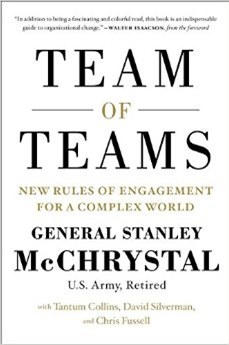 |
|
Leadership from the Field - Best practices for leading teams!
|
|
 |
 |
 |
 |
 |
 |
 |
 |
 |

Cultural Transitions Through Strategic Change and Leadership
|
| |
Leaders' Newsletter June 2015
|
|
|
 |
 |
 |
 |
 |
 |
 |
 |
 |
 |
 |
 |
 |
 |
 |
 |
 |
 |
Welcome to this month's issue of "Leading from the Field."
|
|
Welcome to the June 2015 issue of "Leading from the Field." I am pleased to welcome several new subscribers and followers.

In this issue:
- Leadership from the Field - Best Practices for Leading Teams
- Upcoming Speaking Engagements
- What I am Reading: Team of Teams: New Rules of Engagement for a Complex World by General Stanley McCrystal and Tantum Collins
- Updated Spring Catalog - includes new topics and a curriculum for high potentials
- Author Page
- Latest Book Coming in August 2015!
- BONUS Article: Improving Team Performance - a quick "how-to" for your next team meeting
Also, please check out my website and browse through my blog posts, and leave your comments and replies!
Dr. Jean Ann Larson
Managing Partner
Jean Ann Larson & Associates
800-823-4330 (office)
|
|
Leadership from the field
|

Best Practices for Leading Teams
When I first started my business, I interviewed over 50 leaders in a variety of industries asking them to identify their top three challenges, what they were doing to overcome those challenges and what they felt were key competencies for leaders in the future. One of the top challenges across all industries was the need to identify and develop our future leaders. One of the most important competencies identified for those future leaders is their ability to lead teams. The challenges we face are so complex that we cannot expect to go it alone as a leader. And, one of the most effective instruments we have as leaders to influence culture is our ability to build and develop strong teams. Based upon that earlier research and my own experience, I offer a few best practices:
- Make sure that you are actually leading a team and not just a group of people who report to you. In order to do this you're going to have to treat that group of people as a team. How do you do that? By having regular team meetings that highlight the team goals and the collaboration required to meet those goals. (One client shared with me that she only met one-on-one with her direct reports so as to not waste their time in meetings. When I pointed out the benefit of having everyone focused on the same goals while collaborating and executing on those goals, a lot more work could get done, she quickly adopted brief, weekly team meetings.)
- Make sure that the team goals are clear to the team and that everyone knows his or her role as well as the mission, vision and role of the team in the organization.
- Communicate clearly within the team. A way to jump start this is to understand your own and others' communication styles in order to more effectively communicate and use your individual differences for better problem-solving and decision-making.
- Meeting etiquette is key - Make sure that you have an agenda, meeting purpose and a set of ground rules for all your meetings.
- Manage the good and the bad behaviors. Make sure that everyone's opinion is heard and do not allow any sort of bullying, such as interruptions, dissing of someone else's input, etc. I usually try to address bad behavior as immediately as possible, both during the meeting and then later to make sure that my message was heard.
- Defer to the wisdom of your team. Sometimes as leaders we can shut down team members. Understand your communication style and flex it to bring out the best in others on the team.
- Improve your own emotional intelligence and know your trigger points.
- Be mindful of group behavior and use assessments and other ways to get to know yourself, the other team members and to help the team learn and grow.
Strong teams are our best weapon for improving the effectiveness of our organizations. Per W. Edwards Deming, "Research shows that the climate of an organization influences an individual's contribution far more than the individual himself." Creating strong teams is one of the quickest routes to improving the climate of the organization.
Also see the article, Improving Team Performance at the end of this newsletter help your team get effective fast!
If you have any questions about this article, hit reply to this message!
Visit my website at www.jeanannlarson.org or send me a note at jeanann@jalarson.net
Jean Ann Larson & Associates
800-823-4330 (office)
Email ~ Website
|
| Up-coming Speaking Engagements |
June 1st at the Institute for Industrial Engineers National Conference in Nashville, TN - Topic - Managing Your Own Professional Transitions.
I was also part of a panel with leaders from Disney, Tesla Motors, Hallmark and FedEx Office discussing what leaders look for in industrial engineers who want to move into management.
Click here to register.
June 17th - a FREE virtual leadership briefing sponsored by the Healthcare Information and Management Systems Society TOPIC: Work Life Balance
Session 3: 11:30 - 12:00 PM CT
Summary Description: Work life balance is a challenge throughout our lives. This event will help you focus on what matters most so you can effectively balance how and where you spend your time.
Contact me for more information and for a link to this complimentary webinar
June 19th - Keynote Speech to the Leadership Essentials Institute at the University of Alabama Birmingham - Envisioning the Path Forward: Implementing Effective Transformational Organizational Change - 8:15 - 9:15 AM CT
Creating cultural change is necessary and needed if an organization expects to truly transform care. While improving care, optimizing processes, and revolutionizing care delivery is difficult work, the rewards are many for the organization that is truly successful.
You will learn to:
1) Recognize the components of organization change
2) Identify ways that you can contribute to transforming both people and processes
3) Review lessons learned from many years of healthcare experience
Event Description. This HIMSS Leadership Institute, focused on aspiring leaders and executives in the health IT setting, will provide attendees with the guidance, concepts, and information needed to ensure understanding of the effective organizational leadership strategies and tactics that are needed to position both the organization and the health IT professional for success with the challenges of today and tomorrow. Working very closely with University of Alabama - Birmingham, in the School of Health Professions Executive Learning Center as a host-partner, we have developed a customized agenda which identified topics based on the needs of the facility.
Contact me for more information or click here to register for this session
June 24th for the Executive Healthcare Network - Dallas- 7:00 AM at Bravotech Offices
Topic: A Panel Discussion: Better Health Care and Lower Costs: Accelerating Improvement through Systems Engineering
In a report titled, Better Health Care and Lower Costs: Accelerating Improvement through Systems Engineering, a recent Presidential Advisory panel of experts note:
- The health-care system is challenged by rising costs, now one-fifth of the United States' gross domestic product (GDP).
- A significant portion of those costs do not produce better health or quality of care.
- The report provided a comprehensive set of recommendations to address these cost and quality challenges, including through an interdisciplinary approach known as systems engineering.
- Systems engineering and management engineering tools have been widely used in other industries, such as manufacturing and aviation, to improve efficiency, reliability, productivity, quality, and safety of systems. Systems engineering is an interdisciplinary approach to analyze, design, manage, and measure a complex system in order to improve its efficiency, reliability, productivity, quality, and safety.
Panelists will discuss the recommendations and share obstacles and opportunities for systems engineering in their organizations. They will also share examples of how they are implementing the recommendations of the report in their organizations. Panelists include industry experts from Dallas-area organizations such as Parkland Health and Hospital System, CHRISTUS Health, RTKL, Baylor Scott and White, and Tenet Healthcare Corporation.
Contact me for more information and for an invitation to attend as my guest.
July 29-31 - INFORMS Healthcare at the Omni Nashville Hotel in Nashville. I am copresenting with two colleagues from Spectrum Health in Grand Rapids, Michigan. Our topic is Soft Skills for Leaders in Healthcare Analytics
September 30- October 2 in Atlanta at the IIE Lean Engineering Conference on Mastering Your Own Lean Professional Transitions
For more information on any of these engagements or conferences or to book me for your organization or event, please email me at jeanann@jalarson.net or call me at 800-823-4330
Jean Ann Larson & Associates
800-823-4330 (office)
|
 |

Team of Teams: New Rules of Engagement for a Complex World by General Stanley McCrystal, Tantum Collins, David Silverman and Chris Fussell

When a good friend who also happens to be well read tells you about a great book, you pay attention. My friend, Cathy Anwyl who is also a seasoned Human Resources executive and leader sent me the following note:
I wanted to share with you a new book that recently came out that I think you would enjoy - I have finished my first read and am going back to re-read. The book is Team of Teams: New Rules of Engagement for a Complex World. It is authored by General Stanley McChrystal (US Army, Retired) and three associates. You may recall that he played a significant role during the war with Iraq; he has since started a consulting group and teaches at Yale. He outlines how Al Qaeda changed the way the war was being fought and the change he had to lead the military, et al through to respond. I think you will find the book fascinating given your educational background and your areas of focus. I think this book should be a must read for anyone in business leadership.
In addition to the experience in the theater of war, he provides some very interesting examples where organizations had to completely rethink how they approached various issues - much of what comes out may seem a bit obvious but like any institution/organization, we tend to think within the boundaries of conventional wisdom. In the case of Al Qaeda, the US Military was forced to make significant changes (including breaking down long time silos and getting people ready for a new method of management/leadership) if we were going to achieve success. He is very open around where the opportunities were.
When I mentioned that I had read the book review in the Wall Street Journal, Cathy's opinion was that they had actually undersold it. What is intriguing is the new organizational model the authors describe that was used in battle that also has practical implications for leading teams in many industries. In graduate school we often discussed how organizations needed to be viewed and managed as evolving organic systems rather than the hierarchical organizations that have been in fashion since the work of Frederick Taylor at dawn of the industrial age. And though this makes sense, what is tough to discern is just HOW we go about leading these organic organizations without completely abdicating all accountability.
Here's what it says on the book's website:
What if you could combine the adaptability, agility, and cohesion of a small team with the power and resources of a giant organization?
When General Stan McChrystal took command of the Joint Special Operations Task Force in 2003, he quickly realized that conventional military leadership approaches were failing. Al Qaeda in Iraq was a decentralized network that could move quickly, strike ruthlessly, and seemingly vanish into the local population. The allied forces had a huge advantage in numbers, equipment, and training-but none of that seemed to matter.
To defeat Al Qaeda in Iraq, McChrystal and his colleagues discarded a century of conventional wisdom and remade the task force, in the midst of a grueling war, into something new: a network that combined transparent communication with decentralized decision-making authority. The walls between silos were torn down. Leaders looked at the best practices of the smallest units and found ways to extend them to thousands of people on three continents, using technology to establish a oneness that would have been impossible even a decade or two earlier. The task force became a "team of teams"-faster, flatter, more flexible-and beat back Al Qaeda.
In this powerful book, McChrystal and his colleagues show how the challenges they faced in Iraq can be relevant to countless businesses, nonprofits, and other organizations. The world is changing faster than ever, and the smartest response for those in charge is to give small groups the freedom to experiment while driving everyone to share what they learn across the entire organization. As the authors argue through compelling examples, the team of teams' strategy has worked everywhere from hospital emergency rooms to NASA and has the potential to transform organizations large and small.
This would be a great book for book discussion around Leading Teams. If you're interested in a virtual book discussion of this book, drop me a note via email.
Click here for more information.
|
|
Updated Spring Keynote Speeches and Workshop Catalog

If you're interested in a copy of the Spring Catalog, send me a note at info@jalarson.net with CATALOG in the subject line.
|
|
"If your actions inspire others to dream more,
learn more, do more and become more, you are a leader.
- John Quincy Adams (sixth President of the United States)
|
 Check out my Amazon.com author page
|
 Coming Soon! New Book

My latest book is coming out in August 2015.
You can preorder it at a 20% discount by following this link:
http://www.crcpress.com/product/isbn/9781482225143
Here's what people are saying:
"Dr. Jean Ann Larson has developed an invaluable technique that integrates process re-engineering and change management functions derived from her years of experience in the healthcare provider industry. This novel technique will assist healthcare organizations to successfully transcend the implementation of new clinical and financial processes that will be required to address fee for value business models. This book will become an invaluable tool for healthcare executives as they address the pain points of moving from fee for service to fee for value." - Michael W. Davis, Principal, Mountain Summits Advisors LLC, Denver, Colorado
U.S. healthcare is beyond simply picking the "low hanging fruit" of siloed process improvement initiatives. True transformational change is a product of highly effective communication, collaboration, trust and a clear vision of the desired future state. Jean Ann cleverly aligns the best tools and techniques together that drive reliable, sustainable change to our modern healthcare organizations. Rudy Santacroce, PE, Vice President, Operational Excellence, RTKL and Associates, Dallas Texas
If you need to lead your organization through fundamental change and improvement, this book provides a road map along with case studies, templates and lessons learned.
|
 Check out my website and browse through my blog posts, and leave your comments and replies. And don't forget to sign up for my blog posts!Subscribe here |
|
"Character is the architecture of the being." - Louise Nevelson
|

See how we combine powerful diagnostic tools with facilitated workshops to help individuals, teams and organizations become more effective and get better bottom-line results. CLICK on the button to your right and enter the code 221778TES for a no-obligation, COMPLIMENTARY assessment to get started today. Click Here
|
|
Improving Team Performance - a quick "how-to" for your next team meeting
|
 
Do you want to make your team more effective fast? Your team can't improve until you know exactly what needs improving. Identify current problems and create a bank of ideas to solve them by asking team members to complete statements such as:
* "This work is difficult. It could be made easier by...."
* "I have to keep my eye on...."
* "I could get a lot more done if I didn't have to...."
* "I'd like to work in a place where...."
* "I'd like to reduce...."
* "Things would definitely go according to plan if we...."
* "I want to become...."
* "The policy says to do it this way. But I think we'd get better results if...."
* "The work would flow much more smoothly if...."
* "I can't relax because...."
Suggestion: Write each of these statements on an index card, and distribute a complete set to every team member. Pass out the cards at a meeting and explain how you'd like to use them to improve the team's productivity and work environment. Ask team members to return the completed cards to you. Consolidate the suggestions into one document to hand out at the next team meeting. Use it as the basis of a brainstorming and problem-solving session.
Go-Go Tools, Shigehiro Nakamura. Productivity Press, P.O. Box 13390, Portland, OR 97213. 1-800-394-6868.
|
 See you next month
If you would like to continue the discussion, follow me on Facebook, Twitter, LinkedIn and Google+ reply to this Newsletter or call me at 1-800-823-4330.
Please follow me on  Facebook, Facebook,  Twitter, Twitter,  LinkedIn and LinkedIn and  Google+. Google+.
All the best!
Jean Ann
|
|
|
|
 |
|
 |
|
 |
 |
 |
 |
 |
 |
 |
 |
 |
|
 |
|